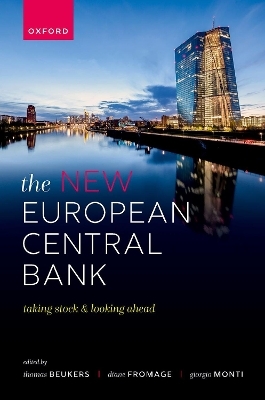
The New European Central Bank: Taking Stock and Looking Ahead
Oxford University Press (Verlag)
978-0-19-887123-1 (ISBN)
The European Central Bank (ECB) was first introduced in the European legal order on the occasion of the Treaty of Maastricht (1992). An official EU institution which is governed by EU law, the ECB of modern times differs vastly from its inception in 1998, which manifests in three main ways: monetary policy options, consideration of concerns other than low inflation in its policy-making, and its role in the Banking Union.
This edited collection offers a retrospective and prospective account of the ECB, charting its evolution in detail with chapters written by leading academics and practitioners. Part 1 examines the substantive changes to monetary policy introduced by the ECB as a consequence of the financial and sovereign debt crisis by considering their legal basis. Part 2 moves beyond monetary policy by shifting to the new roles that the ECB has been called upon to play, notably in banking supervision and resolution. Parts 3 and 4 deal with transformations to inter- and intra-institutional relations, and take stock of these transformations, reflecting on the nature of the ECB of current times and which direction it could be heading in the future.
The authors analyse the most salient and controversial elements of the ECB's crisis response, including unconventional monetary policy measures and the ECB's risk management strategy. Beyond monetary policy, the book further examines the role played by objectives such as financial stability and environmental sustainability, the ECB's relationship to the Lender of Last Resort function, as well as its new responsibilities in the Banking Union.
Thomas Beukers is a Senior Legal Advisor at the Dutch Ministry of Foreign Affairs and editor of the European Constitutional Law Review. His research includes the relationship between law and politics, the constitutional law of the European Union, and the constitutional development of the European Union, and Economic and Monetary Union. Diane Fromage has been a Marie Skłodowska-Curie Individual Fellow at Sciences Po Paris (Law School, IMPACTEBU Project) since September 2020. Her research focuses mostly on the Economic and Monetary Union and the Banking Union especially and on parliaments in the European Union. Giorgio Monti is Professor of Competition Law at Tilburg Law School. He is joint editor of the Common Market Law Review. His research is in the fields of competition law and European Union Law.
1: Thomas Beukers, Diane Fromage and Giorgio Monti: Introduction: the 'new' European Central Bank
The ECB's response to the financial and sovereign debt crisis: Unconventional monetary policy and the lender of last resort function
2: Vestert Borger: The transformation of the ECB in sovereign bond markets
3: Klaus Tuori: The ECB's unconventional quantitative easing is turning to conventional monetary policy
4: Jens van 't Klooster: The ECB's collateral framework from the 1990s till the present
Moving beyond monetary policy: The ECB, financial stability, economic integration and the (future of the) Banking Union
5: Agnieszka Smole?ska and Thomas Beukers: The ECB and financial stability
6: Jonathan Bauerschmidt: The ECB and economic integration
7: Kern Alexander: The ECB's role in the European Banking Union
8: Federico Della Negra and Gianni Lo Schiavo: The relationship between the ECB and theNational competent authorities in the single supervisory mechanism: Problems and perspectives
9: Florin Coman-Kund: The role of the ECB in the international arena and the external dimension of EMU: a 'new' ECB within a crippled legal framework?
Institutional setting: the ECB's 'institutional logic' and its relationship with governments, courts and parliaments
10: Alexander Thiele: The independence of the ECB: Justification, challenges and possible threats
11: Fabian Amtenbrink and Menelaos Markakis: The legitimacy and accountability of the ECB at the age of twenty
12: Takis Tridimas: The ECB and the Court of Justice: Old toolbox, new problems
13: Diane Fromage: Assessing and (re-)situating today's ECB in the EU's institutional landscape
14: Ad van Riet: The ECB in the new normal: Organizing fiscal support for monetary policy
A contextual analysis of the ECB
15: Christy-Ann Petit: The ECB mandate - a comparative constitutional perspective
16: Marijn van der Sluis: The Role of Constitutional Law for the ECB: Past, Present and Future
17: René Smits: The ECB's E-ROAD ahead
| Erscheinungsdatum | 13.03.2023 |
|---|---|
| Verlagsort | Oxford |
| Sprache | englisch |
| Maße | 165 x 240 mm |
| Gewicht | 846 g |
| Themenwelt | Recht / Steuern ► EU / Internationales Recht |
| Recht / Steuern ► Öffentliches Recht ► Völkerrecht | |
| Recht / Steuern ► Wirtschaftsrecht ► Bank- und Kapitalmarktrecht | |
| ISBN-10 | 0-19-887123-6 / 0198871236 |
| ISBN-13 | 978-0-19-887123-1 / 9780198871231 |
| Zustand | Neuware |
| Informationen gemäß Produktsicherheitsverordnung (GPSR) | |
| Haben Sie eine Frage zum Produkt? |
aus dem Bereich


